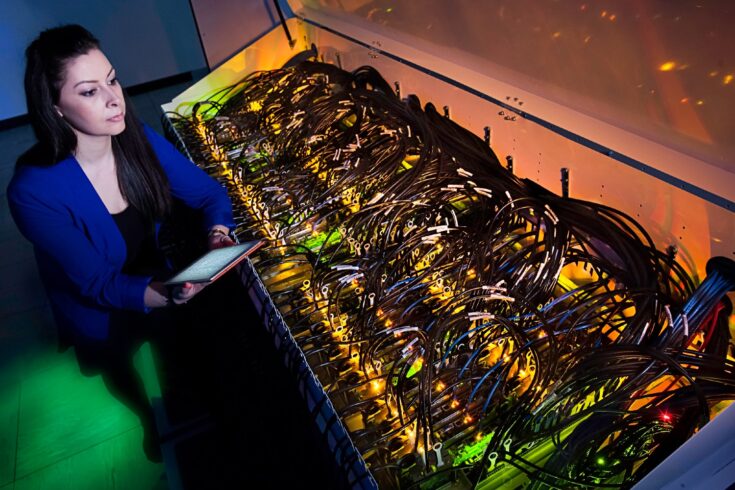The recently published UK Research and Innovation (UKRI) annual reports and accounts for 2019-20 (PDF, 10MB) shows that greenhouse gas emissions from our UK estate fell by 7.5% compared to the previous year.

Rob Gillies, Associate Director UKRI Environmental Sustainability
This reduction in emissions is good news, and of course the impact of coronavirus means our 2020 emissions are likely to be even lower still.
Good news, but much more to do
But with coronavirus-related reductions in emissions being very much temporary, and with research suggesting the global climate impact is likely to be negligible, the urgency of acting is unchanged. Although our science contributes to the global body of knowledge on climate change impacts and the development of solutions, delivering and funding this science contributes to greenhouse gas emissions. If we are to achieve our ambition for our operations to have net zero emissions and be ‘positive for the environment’ by 2040, as set out in our environmental sustainability strategy (PDF, 1.4MB), we must make fundamental changes to the way we work.
The publication of our latest annual report is a good time to take a moment to look at:
- our current environmental performance
- the challenges we have ahead
- how we will be making 2020 a turning point.
Where we are today
Looking at the 2019-20 data in the annual report, you can see that our greenhouse gas emissions for direct operations and business travel was 61,900 tonnes CO2-equivalent – the same as approximately 87,600 flights from Heathrow to Beijing. So where are those emissions coming from?
To deliver our science and research we have large and unique owned and operated estate and infrastructure. This includes science labs, data centres, laser facilities, proton accelerator and 8,000 busy people across our seven research councils, Innovate UK and Research England. As you can imagine, that all comes with a host of environmental impacts, not just greenhouse gas emissions.
You can explore more of our environmental sustainability data in the full annual report which includes details of the actions we took in 2019 to reduce our impact.
Although we are making progress in some areas, our science clearly tells us that we must now take transformational action in the drive towards net zero emissions and wider positive environmental impacts. This means overcoming much bigger challenges such as:
- delivering net zero marine and polar research
- decarbonising high-performance supercomputing
- dramatically improving the environmental performance of our current facilities and laboratories.
Where we’re heading
The new strategy challenges us to be an exemplar of environmentally sustainable research and innovation through our funding and our operations, pushing the scope of our focus out to the wider system in which we operate. Our three long-term goals are:
- We will be net zero for greenhouse gas emissions associated with our operations by 2040. That means we are committing to reducing and abating the emissions from our buildings, facilities, research equipment and travel.
- We will be positive for the environment – this means we will ensure the responsible and efficient use and reuse of all our resources, eradicating single use materials where possible and protecting and regenerating biodiversity.
- We will set the standard and ensure our funding is a force for positive environmental change. We will work beyond our own operations and seek to collaborate with our suppliers and the businesses, universities, and scientific institutions we finance.
From strategy to delivery
What are we doing to ensure 2020 really is a turning point in UKRI’s environmental journey? We are already taking steps to ensure we have the right people and infrastructure to help deliver significant change across our organisation. A new team is in place to coordinate our actions and we are now working with all the councils to create action plans against the interim five-year milestones set out in the strategy.
We will initially focus on the impacts of our own operations. We have started the process of:
- embedding environmental sustainability into our leadership team objectives
- developing pathways to net zero for our current operations
- creating biodiversity action plans across the entire UKRI estate.
We will also look at our supply chains, developing the culture and the processes to demand environmental sustainability performance from our current and future suppliers.
Delivery will require the roll-out of tried and tested solutions but also the development of new technologies and approaches to how we deliver and fund our science. UKRI is in a unique position to both influence and benefit from the knowledge within our own institutes, centres and scientists, as well as the wider research base that UKRI supports, to build understanding and apply the new solutions we will need to continue to deliver critical science in a sustainable way.
By working together
We know that to overcome some of the most challenging obstacles ahead, and to truly make 2020 a step change for environmental sustainability, we will have to collaborate across our own organisation and with our wider stakeholders. We’ll need everyone to help and to play their part, our employees and our partners. But by applying our collective knowledge and passion we can deliver the solutions we need to achieve our targets and contribute to the global efforts to build a sustainable future.
We’ll be regularly updating you on our progress as we deliver our new strategy so watch this space. In the meantime, please get in touch if you have any comments or questions by emailing: ukrisustainability@nerc.ukri.org.
Last updated: 26 November 2020

